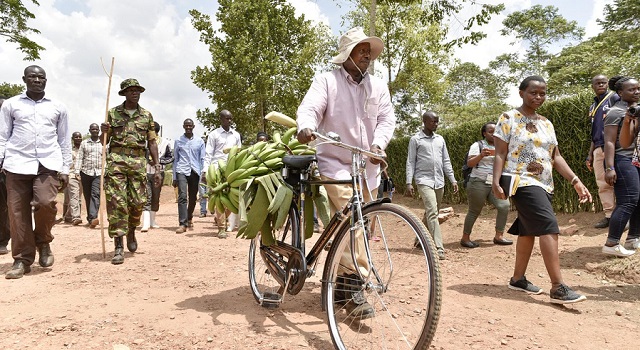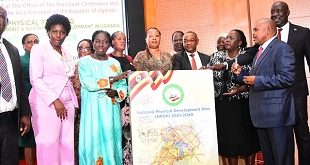
THE LAST WORD: How the president’s successful economic stewardship is now in the past with little direction on the future
THE LAST WORD | Andrew M. Mwenda | President Yoweri Museveni has been named 12th among 24 leaders globally whose individual contribution has had a significant positive impact on their countries’ economic growth. This was in a study by Professor William Easterly of New York University and Steven Pennings, a researcher at the World Bank. The rankings placed Museveni above Lee Kuan Yew of Singapore and Park Chung Hee of South Korea, the most successful leaders to preside over the economic transformation of their nations from poverty to riches within a generation.
The study did not generate any excitement among elite circles in Uganda. Except for a lead story in the state-owned New Vision, there was little said about it. Indeed most people on social media simply ignored it. Had the report presented Museveni among the worst leaders in the world, it is highly probable that it would have made headlines in Daily Monitor and gone viral online. So why is no one interested in blowing Museveni’s trumpet? This will be a debate for another article.
Museveni has presided over economic success when measured by the rate of growth of the Gross Domestic Product (GDP). Between 1986 when he came to power and 2014, our GDP grew at an annual average rate of 6.74% while per capita income grew at annual average rate of 3.5%. This is an impressive performance by both global and historic standards.
Uganda’s high GDP growth rate is even more impressive given that between 1986 and 1996, most economies in the region were suffering slow, stagnant, or negative growth. For example, over this period, Uganda’s GDP grew at an annual average rate of 5.67% – the 25th fastest growing economy in the world and 5th in Africa behind Equatorial Guinea (7th), Botswana (10th), Mauritius (12th) and Swaziland (13th). During this period, Uganda’s immediate neighbours were not doing well with Tanzania (62nd), Kenya (67th) and Rwanda (178th) globally.
The performance of your neighbours has powerful implications on your growth, a factor that this study underlines. This is the reason Singapore’s Lee who performed much better than Museveni is ranked below our president. The study argues that there were other factors such as geographical location and initial endowments like human capital that contributed to growth more than Lee’s individual leadership ability.
Economists discount the first six to eight years after civil war to mark a particular date as a base year to measure growth. This eliminates high growth spikes resulting from initial recovery. In Uganda’s case, we can discount the first seven years and use 1993 as our base here. Here Uganda ran a growth marathon for twenty years from 1993 to 2012, with annual GDP growth rate averaging 7.2%, one of the best in the world.
This growth marathon ended in 2011. While Uganda’s growth between 2012 and 2017 has been mediocre, averaging 4.1%, nations in the region – Ethiopia (9.5%), Rwanda (7.2%), DR Congo (6.9%), Tanzania (6.7%) and Kenya (5.5%) have been doing better. Uganda needs to worry because this slow growth has lasted six years. With annual population growth rate at 3.12%, growth in income per capita has fallen from 4.1% between 1993 and 2014 to 1.01% between 2012 and 2017. Indeed, this also explains the increase in the percentage of people living below the poverty line from 19% in 2013 to 27% in 2017.
What has happened? The country has lost its position as a leading reformer. Previously, Uganda was the policy innovation hub not only for Africa, but other developing countries as well. It was in Uganda that policies were incubated. Upon success here, they would be taken to other developing nations by international development institutions as best practice. Not anymore. Ethiopia and Rwanda, the number one and number two growth superstars of today, are now the policy innovation hubs.
A friend from the international development community who has worked on Uganda since the 1990s visited recently and his comments were discouraging but equally illuminating. “In the old days senior people from the ministry of finance and Bank of Uganda were always thinking about, and fine tuning policies,” he told me over a glass of wine, “I have not seen much evidence of that in the recent few years.”
“Gone are the days when policy makers in Uganda set the agenda on how low income countries can improve their economic outcomes,” he went on, “Those were the days when Ugandan officials led the way in looking for new sources of growth, ways of enhancing budget formulation, efficient spending allocation, monetary policy conduct etc. I could not find anybody thinking about lifting growth rates in policy making circles.”
As a result, the budget-making process has become ad hoc, he said. The recurrent budget has become consistently insufficient thereby making supplementary budgets the norm. Capital expenditures in the budget are driven by projects for which money is available rather than projects with the highest rate of return. There is little effort to push boundaries. Focus is on short term and often, small measures like the social media tax. Overall, Uganda has a fatigued and tired policy making body.
He told me that from his experience of the “good old days”, there was active ownership and deliberation of policies. Nowadays, it seems as if everyone is waiting for oil to come on board hoping that somehow everything will then right itself. Government is massively investing in infrastructure – roads, railways and dams. While this hardware is necessary, it is not sufficient to sustain growth because the software of policy innovation is missing. Then he asked me to contrast this with Ethiopia and Rwanda.
He felt leadership at the ministry of finance and central bank needs to be refreshed big-time so that new thinking and energy can be infused into the system. Uganda has a lot of human capital, he told me, but equally so much pent-up talent. But how do we get new thinking and energy into the system that has been captured by self-interested groups and individuals with a vested interest in the perpetuation of the status quo?
Secondly, one wonders whether at 74 years and after 32 years in power, Museveni is still capable of mounting any serious reform initiative to redirect Uganda’s economy towards more policy innovation and dynamism. This is theoretically possible but whether it is practically feasible is another thing. The fact that a study placing Museveni among the world’s best leaders did not excite popular excitement shows how the government’s intellectual support-base is suffering from lethargy as well.
****
amwenda@independent.co.ug
 The Independent Uganda: You get the Truth we Pay the Price
The Independent Uganda: You get the Truth we Pay the Price


